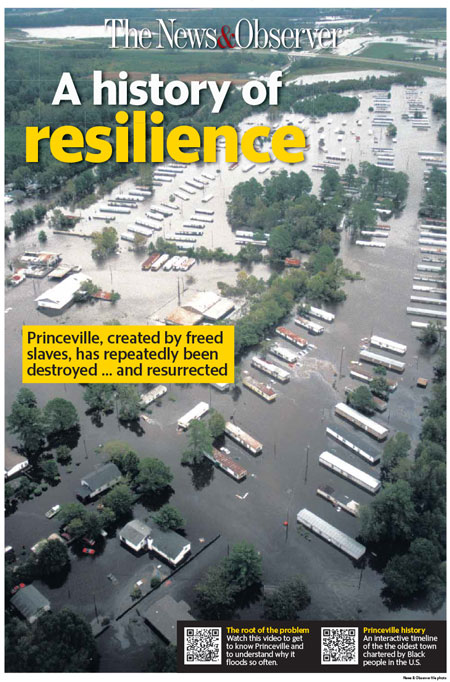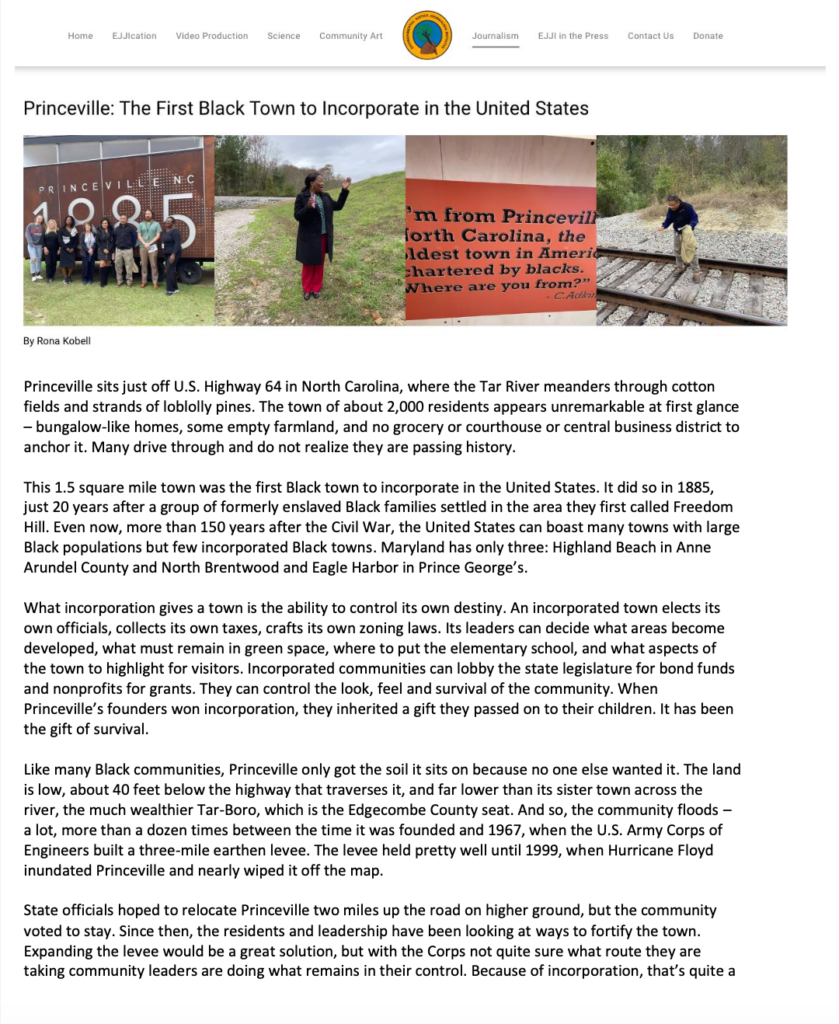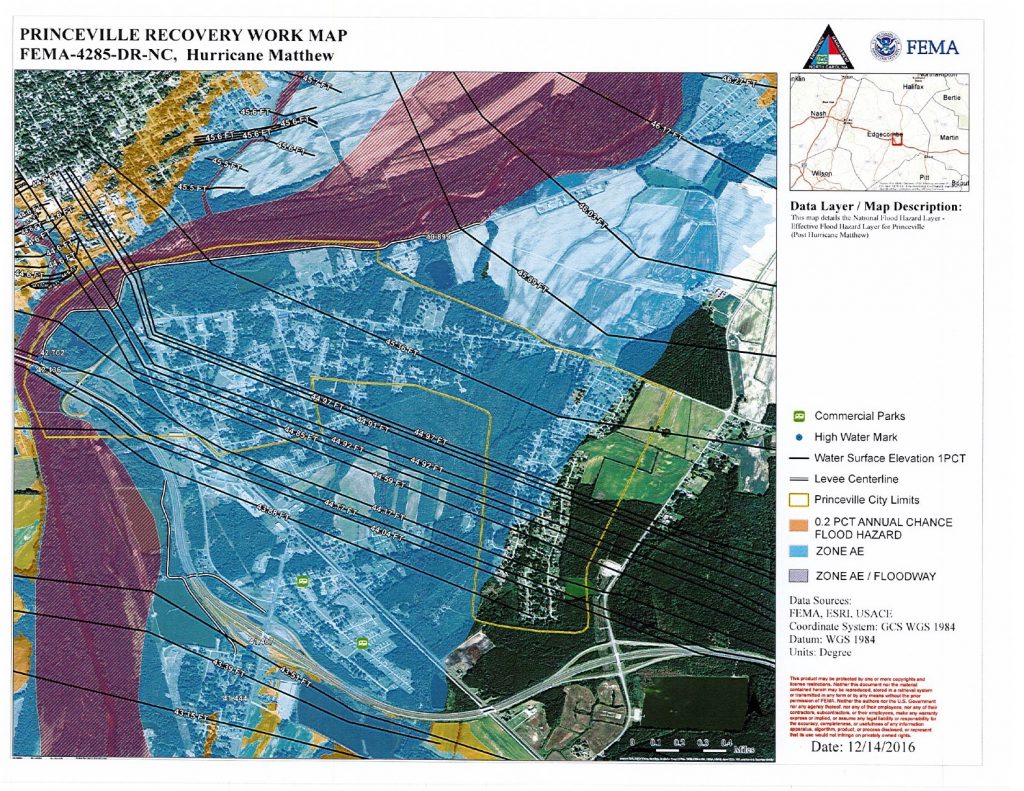In the face of climate change, communities use conservation techniques to rebuild with resilience.
All throughout North Carolina, rural communities established along rivers, the coast and large bodies of freshwater are facing repeated flood events. With the increasing threat of climate change, more communities will experience these impacts.
One town plagued by the rising waters of catastrophic flooding is Princeville, a town of about 2,000 people along the Tar River in eastern North Carolina. Devastated by Hurricane Floyd in 1999, nearly every home in Princeville was damaged, and some parts of the town were left more than 20 feet underwater. Every storm after brought anxiety to their residents that they might lose their homes again and with the increase in stronger storms predicted, the town needed a solution.
As the oldest town founded by Blacks freed from slavery in the United States, Princeville has pride in its history. The small but thriving community is grinding against decades of systemic racism that leaves it more vulnerable to the impacts of climate change. Princeville is not alone in this pursuit of environmental justice - studies from the Environmental Protection Agency show vulnerable groups are disproportionately affected by climate change and flooding where people are least able to prepare for or recover from heat waves, poor air quality, and flooding.
Offering novel conservation-based solutions, Conservation Trust for North Carolina partnered with local leaders, universities, businesses, and nonprofits to address issues related to flooding while modeling what it means to be resilient in the face of change. The multi-year “Princeville Collaborative” tapped into multiple funding sources, service corp members, climate experts, and community grit to execute projects that help the town prepare for the inevitable environmental changes ahead.
The projects completed in Princeville planted the seeds of climate resiliency in southeast North Carolina. This community is proof positive that with collaboration, innovation, and funding, our state can stand strong in the face of climate change.
The Collaborative follows a phased approach to achieving resilience.
Guided by the Princeville Floodprint, a plan developed by NC State Coastal Dynamics Design Lab in partnership with town leaders, CTNC and our partners are implementing conservation solutions through a multi-year, phased approach that is guided by data and oriented toward achieving the goals of Princeville’s people.
PLANNING - 2019-2020
Across North Carolina, communities are grappling with the need to answer the question - how do we deal with flooding and the threat it causes to communities? To begin to answer that question, the State set aside $200 million to build a first-of-its-kind statewide flood resiliency blueprint to support elected leaders and community officials seeking to prioritize projects that build future resilience to flooding. Guided by the Princeville Floodprint, a plan developed by NC State Coastal Dynamics Design Lab in partnership with town leaders, CTNC and our partners are implementing conservation solutions through a multi-year, phased approach that is guided by data and oriented toward achieving the goals of Princeville’s people.
Due to our success, Princeville and the model developed in partnership with CTNC and NC State have been lifted up as a solutions-oriented process to replicate. NC State Coastal Dynamics Design Lab has been contracted to build floodprints for six additional communities in 2024.
PHASE I - 2021-2022
During Phase I, in partnership with the Town of Princeville and Princeville Elementary School, the collaborative constructed a section of the Heritage Walking Trail, installed rain gardens and other stormwater management features to address water runoff from the school building, built an outdoor classroom for teachers and students to incorporate conservation into their lesson plans, and placed a Resilience Corps NC environmental educator to provide additional capacity to the school staff.
PHASE II - 2022-2023
Phase II of the project expanded beyond the school and sought to convert vacant land into productive community benefits. This included restoring acres of wetland to manage flood water better and establishing a model community garden in partnership with the Town. The Collaborative continued to partner with Conservation Corps NC to hire youth to construct a walking trail at Heritage Park.
BEYOND
The Town of Princeville continues to seek funding to complete projects that further reduce the impacts of flooding. The town is more prepared for the future with a renewed outlook on managing climate change.
Inspired by the success in Princeville, CTNC, in partnership with VolunteerNC and the Governor’s Office, piloted the state’s first Resilience Service Network to address capacity issues at the local level through an effort to deliver resilience projects in communities across the state. There are teams in 25 communities across the state in 2024.
With unique, conservation-based partnerships, every community in North Carolina should have the tools to rise above the impacts of climate change and make a resilient future possible. This journey begins with you. With your support, we can build a more resilient North Carolina that stands firm in the face of climate change. Join us. Donate today.
With unique, conservation-based partnerships – every community in North Carolina should have the tools to rise above the impacts of climate change and make a resilient future possible.
This journey begins with you.
Learn more about our collaborative approach to conservation in Princeville, N.C.




